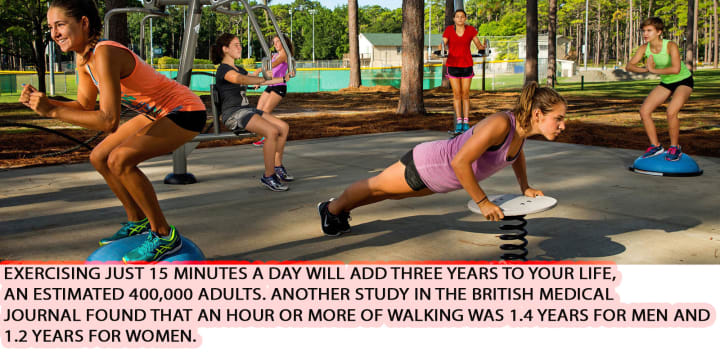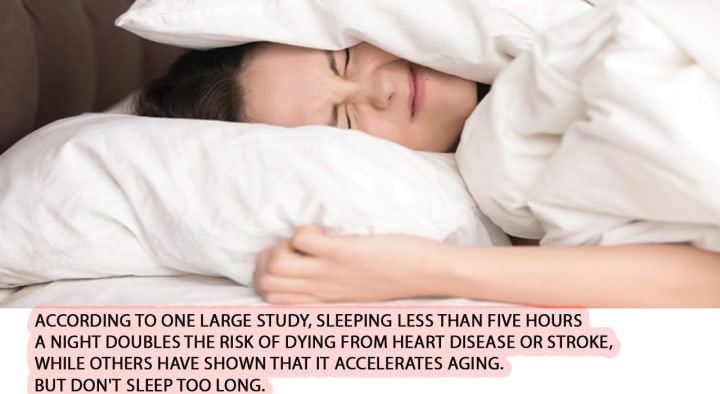Here are six simple lifestyle changes that will help you feel better and live longer
Dr He is a Consultant Hematologist and Lifestyle Medicine Specialist at King's College Hospital, London. Shirin Kasam outlined six ways to feel better and live longer.

Doctors have discovered a new generation of 'drugs' that can prolong and prevent life - or in some cases reverse - diabetes, heart disease, cancer, stroke and other killers.
They also reduce the risk of life-limiting conditions such as dementia, arthritis, depression and COPD.
There are no bad side effects, no big flaws - and they also help protect against viruses like Kovid-19.
This may sound too good to be true, but it is actually a proven recipe for a healthy, happy and long life -
And it is based on six common ‘lifestyle medications’.
Consultant Hematologist and Lifestyle Medicine Specialist at King's College Hospital, London. As Shirin Kasam explains, "80% of the diseases we deal with are preventable from a lifestyle standpoint."
The evidence for this is overwhelming, and earlier this year the Pharmaceutical Journal - the industry's biblical lifestyle - supported this view with a separate series on medicine.
However, research for PureSentile, a health-care essential oil product, found that 70% of consumers have not heard of lifestyle drugs - yet two-thirds say they should quit.
GP was the founder of the British Society of Lifestyle Medicine. Dr. Rob Lawson says the benefits depend on your age, general health and the individual adoption prescription you receive - but the benefit is guaranteed.
There are six types of lifestyle therapy - healthy eating, regular physical activity, getting enough good quality sleep, reducing stress, building strong community relationships and supportive relationships, and reducing your exposure to toxins.
Kasam says the doctor is "all this common sense stuff." "But we go far beyond what is healthy. Our focus is on health care rather than health care."
So, how can this recipe be applied for health and happiness? Dr Lawson says it's important to make lasting changes and change them into habits.
"It doesn't take a while to be fully active, but in six to eight weeks you will see real improvements."
For example, there is also the benefit of knock-on - excessive exercise reduces stress, improves sleep and helps with weight loss - so compatibility increases quickly. Here's how you can write your own prescription for health and happiness.
1. Food for thought
We all know that you should eat at least five servings of fruits and vegetables a day, and a study estimates that this will make your life a year - and yet only 28% of adults are reaching this goal.
To ensure a variety of nutrients, try to eat only once a day and go for different colors.
Both Dr. Criterion and Dr. Lawson recommend eating ultra-processed foods. Foods that make color, artificial flavor, preservatives, and sweeteners are not what you add when cooking at home.
Increasing evidence fiber is also important. The Scientific Advisory Committee on Nutrition recommends that the average intake should be increased by 30 grams per day - 30% per day - to reduce the risk of heart disease, stroke, diabetes and bowel cancer. Whole grains are a good source of fiber, and switching to whole pasta and brown rice is another way to increase intake.
2. Work it out

Exercising just 15 minutes a day will add three years to your life, an estimated 400,000 adults. Another study in the British Medical Journal found that an hour or more of walking was 1.4 years for men and 1.2 years for women.
The official advice is that we should all get at least 150 minutes of moderation. Intense activity or 75 minutes of intense activity every week.
It should include at least two exercises that include strengthening exercises to work the major muscle groups.
"Better than nothing," says Dr. Lawson. One step in the right direction is to sit beyond the bell at once.
Sleeping for an hour or more activates metabolic changes that increase the risk of diabetes and heart disease.
Researchers at the University of Leicester counted middle-aged adults sitting for more than nine hours a day, doubling their mortality risk.
Stand up for the phone call - if you sit down it will burn 50 calories.
Do this when the kettle is boiled - a study has found that blood sugar increases 16% for 20 minutes and a heart rate 17%.
3. Enough and good sleeping

According to one large study, sleeping less than five hours a night doubles the risk of dying from heart disease or stroke, while others have shown that it accelerates aging. But don't sleep too long.
A study of 1.1 million adults found that those who slept 8.5 hours or more were 15% more likely to die for six or seven hours than those who died within six years.
In addition to giving the body time to rest and repair, sleep helps regulate glucose metabolism and blood pressure.
Sleep deficiency has been shown to increase the risk of esophageal cancer because it suppresses the production of ghrelin and leptin, which inhibit hunger.
Sleep also plays a big role in our mental health.
Significant UK research has found that 80% of people with depression also suffer from sleep problems - twice, they have no psychological problems. Avoiding the screen and bright lights for an hour or two before bedtime is the key to regular night sleep. Make a conscious effort to relax with gentle stretching and deep slow breaths.
4. Reduce stress
Researchers at Harvard University in the US say it can take up to 33 years for your life to work in a stressful environment. Closer to home, the Department of Health estimates that it has a positive outlook for between four and 10 years.
Levels of stress hormones such as cortisol and fuel are constantly on the rise
Swelling. Stress has also been shown to boost immunity and slow wound healing.
MRI scans show positive changes in brain activity in those who meditate regularly for two months.
Exercise is another effective way to relax - a UK study on 20,000 adults found that exercising at least 20% or active walking reduces the risk of anxiety and stress by 40%.
5. Friend for life
Dozens of studies have concluded that people who have strong ties with family and friends are less likely to have health problems and live longer than those who don't.
Friendship in fact changes our body chemistry, lowers blood pressure and C-reactive protein - a marker of inflammation.
Try not to have the Kovid-19 lockdown cut ties - pick up the phone or connect via Skype and other video calling software. See if there is an online game you can share with a friend or family.
6. Toxic habits

A larger study has reported that the average life span of those who smoke 20 or more cigarettes per day is 13 years, with one in four smokers dying.
There has never been a better time to leave China - China data shows Men are more likely to die of coronavirus than women because men are more likely to smoke.
A study in the British Medical Journal found that almost all extras were eliminated before the age of 35 and that stopping before 45 was largely preventable.
Drinking too much will shorten your life. Researchers researching the drinking habits of over 600,000 people in 19 countries have found that 10 or more drinks per week can shorten your life by one to two years.
And 18 or more cuts over a four or five year life span. Reducing its intake is easy, so keep your intake number for a day or two so you can get clear.
Watch your actions, especially during the Covid-19 Emergency - Study show drinks offered at home are far more generous than those offered at pubs and restaurants.
About the Creator
tarikul islam
I am a varsity students, like to read articles of medium.com and so others magazines of different country. I also like very much to write articles about many of topic like health, tech etc. I am here want to enjoy my writing career. Thanks.






Comments
There are no comments for this story
Be the first to respond and start the conversation.